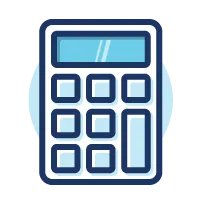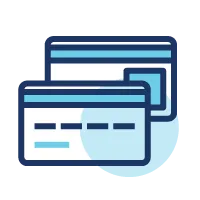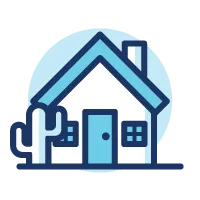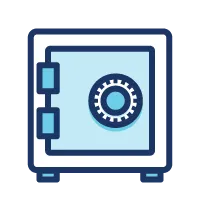What We'll Cover
- How to budget for paying off student loan debt
- Using a student loan debt calculator to determine how long it will take you to pay your loans off
- Tips to help you pay off student loan debt fast
- When student loans can be forgiven
Do you have a mountain of student loan debt? You’re not alone – our country currently has $1.75 trillion in total student loan debt, with an average of $28,950 owed per borrower.
Paying back student loans can feel like it takes forever. When you’re fresh out of college, you’re hit with several financial priorities – getting a job, paying rent, paying for a car to get you to your job, etc. You’re likely just trying to get by on the minimum payment with your student loans.
But that minimum payment is what will keep you paying off student loans well into your thirties, maybe even forties. It’s not always feasible to prioritize student loan debt over other financial goals, but if you’re ready to ditch the debt, we have some tips on how to pay back student loans faster.
How to Pay Back Student Loans in 7 Steps
Here’s how to pay back student loans faster so you can move on to your next financial goal.
1. Create a budget.
Creating a budget will show you how much money is coming in and where it’s going each month. This step is important because you’ll learn where you might be able to cut back on costs and put that money toward your student loan debt.
Keeping track of your expenses each month will help you stick to your goal of paying off your student loans fast. What you measure gets managed, so continue to monitor your spending and reallocating toward debt whenever you can.
2. Use the debt snowball strategy.
If you have multiple student loans – private loans, secured loans, unsecured loans – Dave Ramsey’s debt snowball strategy can help you pay off this debt faster.
Start by listing all your loan balances from the smallest to largest. You’ll pay the smallest balance off first, throwing any extra money you can on that first debt while paying the minimums on the remaining loans.
After you’ve paid off the first debt, you’ll take everything you were putting toward the first debt and add it to the minimum of the second balance. Keep repeating the process until you’ve paid off all student loans.
According to Ramsey Solutions, most people who go all in on this play pay off their debt in 18 to 24 months. That sounds way better than forever.
3. Pay more than the minimum monthly payment.
The trouble with making the minimum payment on your student loan debt is that interest continues to pile up, making your payoff timeline even longer. If you can afford to make larger payments, you can attack your debt faster.
Pro Tip: When making larger payments, tell your loan servicer to keep next month’s due date the same and apply the extra amount to your current loan balance. Sometimes student loan servicers put that extra amount onto next month’s payment.
4. Make bi-weekly payments.
If you have only one student loan you’re paying down and you have the funds for it, you might consider making payments every two weeks. Doing so means you’ll make 26 half payments over the course of a year instead of 12 full payments, resulting in one extra full payment on your loan every 12 months.
Another benefit of bi-weekly payments is you’ll pay less interest. The extra payment can go directly toward your principal balance, so less of your payment is wasted on interest over time.
5. Use a Student Loan Calculator to determine how long it will take you to pay your loans off.
Use a Student Loan Payoff Calculator (located below) to see how much time and money you’ll save if you add to your minimum monthly payment. This will help you see how to pay back student loans faster with Steps 3 and 4 above and hopefully motivate you to make those larger payments.
6. Set up autopay.
With a OneAZ checking account, you can set up online bill pay to have us automatically send your payment to your lender on a certain date each month. You can update or change your payment settings at any time. This ensures your payments are made on time each month, helping you avoid late fees. Online bill pay also keeps you on track with paying a larger amount than the minimum payment, if you set it at a higher amount.
7. Use found money toward your student loans.
If you get a raise at your job, hold off on buying a sleek new television and throw that money at your student loan debt. The same goes for tax refunds. If you want to pay off your student loan faster, sacrifice the luxuries for a bit and pay down that debt with any extra money you have.
Student Loan Payoff Frequently Asked Questions
When do you need to start paying back your student loans?
Your federal student loan goes into repayment once you graduate, drop below half-time enrollment, or leave school. But depending on which types of loans you have, you may have different grace periods before you must begin repayment.
- Direct Subsidized, Direct Unsubsidized, or Federal Family Education Loan: Six-month grace period
- Perkins Loan: Nine-month grace period
- PLUS Loan: Goes into repayment as soon as the loan is fully disbursed, meaning once it’s paid out
Pro Tip: The grace period gives you some time to get a job and steady income before you begin making payments. Note that for most loans, interest still accrues during your grace period. If you want to pay off your student loan debt faster and save more money, begin paying them back during your grace period if you can.
How long does it take to pay back student loans?
Federal student loan repayment is structured to take about 10 years to pay off, but different factors can make repayment shorter or even twice as long. How long it takes to pay off your student loans depends on how much you borrowed, the interest rate, and whether you’re able to make more than the minimum payment each month.
Will student loans be paused again?
The Biden administration will not extend the student loan payment pause again.
In March 2020, the Trump administration paused student loan payments and interest accrual due to Covid-19. The pause has since been extended eight times between President Trump and President Biden, but federal student loans will start accruing interest again on September 1 with payments being due in October.
How can I get my student loans forgiven?
The U.S. Department of Education offers several forgiveness programs for federal student loans, including:
- Income-Driven Repayment Forgiveness
- Perkins Loan Cancellation and Discharge
- Public Service Loan Forgiveness
- Teacher Loan Forgiveness
Learn the qualifications for each student loan forgiveness program by clicking the links above.
Should I refinance my student loan debt?
If you have good credit and income to pay off your debt, it’s worth refinancing your student loan for a better interest rate. This saves you money in the long run. Especially if you have private student loans, it helps to refinance because these loans aren’t eligible for federal loan programs that can lower your monthly payment or qualify for loan forgiveness.
Key Takeaways
- Making bi-weekly payments means you’ll pay your student loans back faster and you’ll pay less interest.
- Federal student loan servicers offer a quarter-point interest rate discount if you let them automatically deduct payments from your bank account.
- If you have good credit and a steady job, you might want to look into refinancing your student loans.
Student loan debt doesn’t have to take you decades to pay off. Use these 7 tips for how to pay back student loans fast and you’ll be able to move toward new financial goals in far less time, even just a few years. Set your deadline and stay motivated toward your goal. Don’t forget to treat yourself and celebrate when you make your final student loan payment!
APR = Annual Percentage Rate












